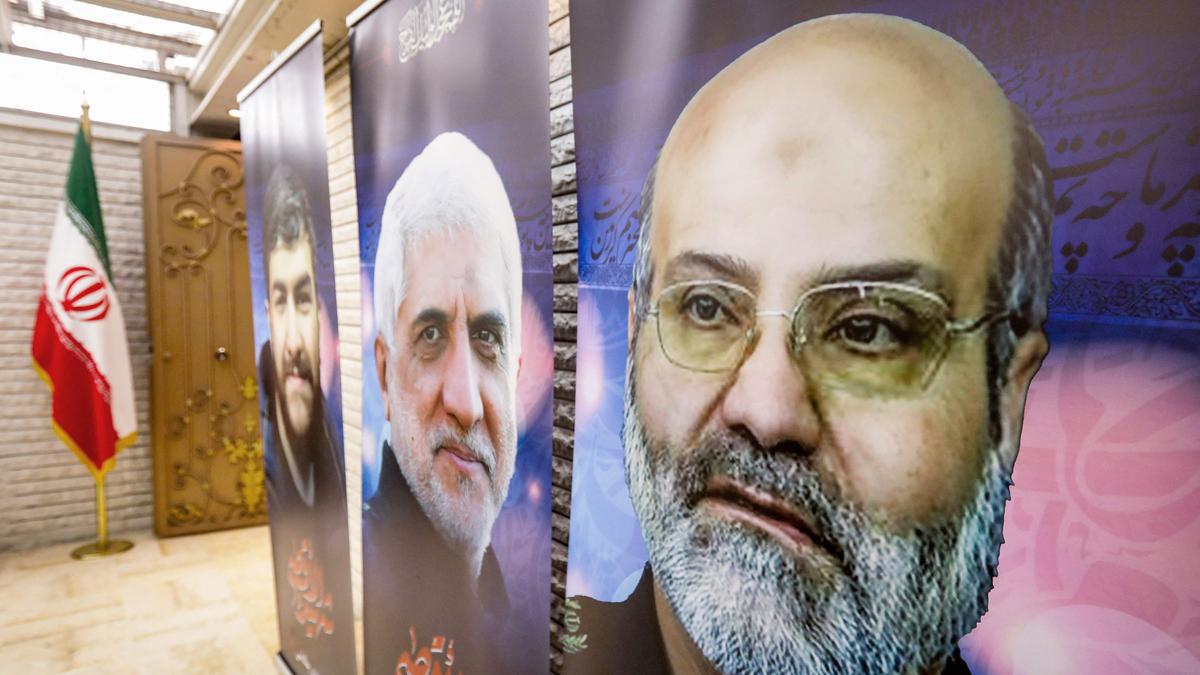Posters depicting victims of an air strike on the consular annex of the Iranian embassy’s headquarters in Damascus are displayed during a memorial service for them at the premises in the Syrian capital on April 03, 2024.
| Photo Credit: AFP
“We are in a multi-front war, offensively and defensively,” Israel’s Defence Minister Yoav Gallant said on Tuesday, a day after Israeli warplanes attacked an annex of Iran’s Embassy in Damascus, killing at least 13, including a senior Iranian General. A few days earlier, Israel had attacked a weapons depot in northern Syria, killing at least 38 Syrian soldiers and half a dozen Hezbollah fighters. “We are acting everywhere and every day to prevent the strengthening of our enemies,” declared Mr. Gallant.
Since October 7, when Hamas, the Palestinian Islamist group that has Iran’s backing, carried out a cross-border attack in Israel, killing at at least 1,200 people, Israel has carried out dozens of air strikes in Syria and Lebanon, besides its full-throttled invasion of the Hamas-run Gaza Strip, hitting Iranian, Syrian and Hezbollah targets.
Octopus doctrine
Israel sees Iran as its main enemy — the meeting point of all anti-Israel non-state actors in West Asia, be it Hamas, Hezbollah, Houthis or the Islamic Jihad. Its post-October 7 military response has two sides. One, continue the war in Gaza until Hamas’s military capabilities are destroyed (and possibly reoccupy the enclave) and two, step up the shadow war with Iran by openly targeting Iranian military figures and assets. As former Prime Minister Naftali Bennet once put it, Israel sees Iran as the head of the octopus, while the militias are its tentacles. Israel is now attacking both the head and the tentacles simultaneously.
Also Read | Iran vows response after strike it blames on Israel demolishes consulate in Syria
Nearly six months of fighting in Gaza has isolated Israel internationally. The high civilian toll in Gaza — over 32,000 Palestinians have been killed, a vast majority of them women and children — has triggered an international outcry. Hamas still holds over 130 hostages, who were captured on October 7. The U.N. Security Council passed a resolution last month, demanding an immediate ceasefire. The Biden administration continues to back Israel militarily, but there is a growing uneasiness in the diplomatic relationship between the two countries. As the Gaza war grinds on, Israeli Prime Minister Benjamin Netanyahu, who is under growing pressure at home to resign and call for an early vote, seems eager to escalate the regional confrontation with Iran. The attack on the embassy annex, which has been labelled as the consular section, was clearly a major escalation in the Israel-Iran shadow war.
Diplomatic facilities have protected status. The 1961 Vienna Convention states that embassy and consular premises should be protected even in times of war. Israel says the annex was a consular section only in the name and it was actually used by the Quds Force. Yet, an attack on a consular building was seen in Iran by many as an act of war.
The message Israel is sending to Iran is clear. Israel has exact intelligence on the movement of senior Iranian military figures. And they are not safe anywhere in Syria (and Lebanon) — even in embassy buildings. In other words, Israel seems determined to fight Iran’s influence in its neighbourhood even at the risk of an open conflict.
Muted response
In the past, Iran’s response to these Israeli attacks has been muted, for two possible reasons. One, Iran doesn’t want to give Israel what it wants — an open regional war. It would rather wait and see how Israel manages the mess in Gaza, while pro-Iran militias would keep needling Israel on the borders. Two, Iran’s military doctrine is rooted in avoiding direct confrontation with bigger powers. It always operates through proxies, in asymmetric styles. It knows that an open war with Israel would be disastrous for the whole region and it could draw the U.S. also into the war. So there is a strong argument in favour of strategic restraint.
Watch | Why is conflict spreading in West Asia?
But on the other side, every time Israel carries out a strike against Iran, it drills holes into the Islamic Republic’s deterrence. Iran’s inability or refusal to respond militarily to Israel’s provocations empowers Israel further. Gen. Mohammad Reza Zahedi, who was killed in the Damascus consulate attack, was a top Quds Force commander of the IRGC’s Syria operations. If Iran cannot respond to an attack on its consulate that killed a top General, it may not be the last such attack Iran faces in Syria or Lebanon. This leaves the Mullahs of Tehran in a dilemma. They have to respond to Israel’s attacks to bolster Iran’s weak deterrence. But they have to do so without triggering an open war with Israel.
